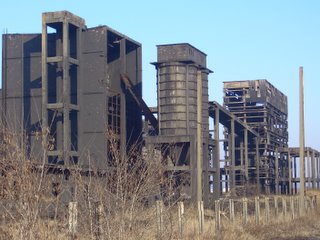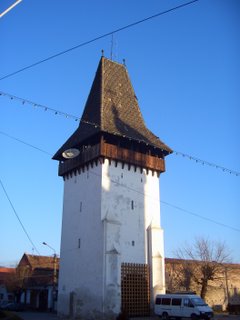Der rumänische Winter - The Romanian winter
Mit –23 Grad am Dienstag und Mittwoch Morgen war es doch ziemlich frisch. Anfang Oktober hab ich das natürlich nicht glauben wollen, und übertrieben haben die Kollegen schon ein bisschen. Denn tagsüber wird es natürlich wärmer, wenn man ungefähre zehn Grad minus so bezeichnen will. Das Kältehoch kam also etwas später, hat sich aber mittlerweile auch schon wieder abgeschwächt. Und zum Glück ist die Heizung nicht ausgefallen. Das war vor einigen Tagen bei unserem früheren Mitbewohner der Fall. Adi hat sich das Wochenende dann im Zimmer von Alex aufgehalten, was möglich war, weil dieser auf Geschäftsreise in Deutschland ist und demnächst wiederkommt. Wie die Straßenhunde die Kälte überstehen, ist mir rätselhaft. Aber zumindest leben unsere zwei „Haushunde“ noch. Die liegen immer vor dem Firmeneingang, als zusätzliche Alarmanlage oder irgendsowas. Lustig ist auch, dass man hier irgendwelche Organisationen anrufen kann, die in der Nacht die Hunde wegfangen, falls sie sich negativ aufs Image eines Unternehmens niederschlagen. Ganz am Anfang meines Aufenthalts habe ich das sogar mal live mitbekommen. Was mit den Tieren gemacht wird, nachdem sie eingefangen worden sind, weiß ich nicht. Sollte mich auch besser nicht interessieren.
Der Winterdienst für Gehwege, sei es der öffentlich oder der private, steckt, gelinde gesagt noch in den Kinderschuhen. Mit anderen Worten: er existiert gar nicht. Da es die letzten Tage wirklich konstant unter null Grad gewesen ist wird der Schnee festgetreten und verwandelt sich irgendwann auf unerklärliche Weise in Eis. Man könnte praktisch Schlittschuhlaufen, jedenfalls bin ich froh, dass ich mir noch immer nicht alle Knochen gebrochen habe.
Dennoch: die Mandeln waren die letzte Zeit etwas entzündet, und so musste ich zum ersten Mal zum Arzt. Zum Rumänischen natürlich, der kein Deutsch spricht. Dennoch alles halb so wild, weil Alexandra und Geir mir geholfen haben: bei der Arztsuche und der Übersetzung der Diagnose. Erwähnte ich schon Mal die Hilfsbereitschaft der Rumänen (und Norweger ;-) ?Wirklich geschwollene Mandeln, aber zum Glück kein Fieber. Trotzdem musste ich Medizin nehmen. Es ist wirlich komisch, wenn man nicht genau weiß, was mann da einnimmt. Der Beipackzettel war natürlich auch auf Rumänisch, und so weit sind meine Sprachkenntnisse doch nicht fortgeschritten, dass ich alles entziffern kann. Jedenfalls wirkt die Medizin, die Beschwerden klingen ab. Die Untersuchung hat zwei Minuten gedauert; in der Arztpraxis bin ich allerdings ungefähr zwanzig gewesen. Der Grund: einen Computer sucht man da vergeblich. Rezepte, Diagnose, Adresse, Quittung etc... wird alles per Hand gemacht. In meinem Fall vom Arzt persönlich. Und bezahlen musste ich die Untersuchung auch, genauso wie die Medikamente. Alles natürlich vergleichsweise günstig, trotzdem werde ich in Deutschland eventuell meine Versicherung versuchweise in Anspruch nehmen. In diesem Zusammenhang sei auch noch ein Sprachführer erwähnt, der vorgefertigte Sätze enthält, welche der deutsche Tourist während seines Aufenthalts gebrauchen könnte. Einer davon: „Ich möchte mich lieber in Deutschland operieren lassen.“ Dann kann ja nix mehr schiefgehen...
Und unerhörter Weise ist mir von einer gewissen Person, der Name sei hier lieber mal nicht genannt, mitten ins Gesicht gesagt worden, dass ich dicker geworden sei. Hmpf. Das sähe man in meinem Gesicht. Den Vorwurf habe ich natürlich vehement abgestritten. Aber vielleicht muss ich doch etwas mehr Sport machen. Wenn der Park nur nicht soweit von meiner Wohnung weg wäre, könnte man z.B. schön joggen. Wie auch in einem Waldgebiet, dass aber auch genau am entgegengesetzten Ende der Stadt liegt.
Was gibt es noch: Momentan bereite ich schon ein wenig meine Rückkher nach Deutschland vor. Ich habe das dumme Gefühl, dass ich mein Studium doch mal beenden sollte, und hoffentlich klappt das auch gegen Ende des Jahres. Irgendwann kommt man an dem Punkt, an dem man akzeptiert, dass man sich dem Einstieg ins richtige Arbeitsleben auf lange Sicht nicht entziehen kann.
----------------
Well, also for a person from the center of Germany minus 23 degress are f*****g cold. But good news: I’m still alive. Otherwise this entry wouldn’t exist. And of course nothing in Romania will bring me down to despair and depression… After four months I’m able to say that. Hihi, how does a marketing campaign says: Romania – simply surprising. In a way… it’s true. And of course my colleagues exaggerated a bit when they said it would be minus 20 degress also during the day. This isn’t true at all, although a temperature around minus 10 in the afternoon is quite fresh. But anyway it’s correct, the high pressure of air which was in the East for a long time reached Romania lately. And fortunately, it is already gone. For example, tomorrow it could be 20 degrees warmer in comparison with last week. Feels like summer ;-) Fortunately our heating system is well working. Adi, our former roommate, asked for accomodation a few days ago because in his apartment the temperatures were about five degress. No place to stay comfortable over the weekend, of course. And so he was allowed to sleep in the room of Alex, our third member in the apartmement, who ist currently staying in … guess what … Germany. He left for a business trip. How the straying dogs face the cold, for me it is a riddle. But at least our two “house dogs”, which are often staying in front of the companie’s gate, are still alive. A kind of additional alarm system, I guess. An interesting thing I have to mention is that you are able to call an organisation or something like this that catches the dogs and helps to improve the image of your company in this way. I myself saw it with my own eyes at the beginning of my stay here in Romania. The dogs were simply caught and brought to… no idea. Probably it’s better not to know it.
The winter service for sidewalks covered with snow is still… hmm… how shall I put this… at the beginning of its development. In other words: it doesn’t exist. And because temperatures were below zero degress the last days, the snow is pressed together by the pedestrians, and I don’t know who, but it turns into ice. So it’s very slithery at the moment, and if I had some skates, I could use them. Nevertheless, I really appreciate that my bones are still safe and sound.
On the other hand, I had – unfortunately – problems with my throat during the last days. It just didn’t stop aching, and so I had to go to a Romanian doctor. Who didn’t speak English or German, of course. But it wasn’t a problem at all, because Geir and Alexandra helped me on that issue. Did I already mentionend that Romanians in general are very hospitable and friendly? The diagnosis was swollen tonsillar (I guess this is not the correct translation), and I really needed some medicine. It’s strange if you don’t know what pills you are taking because you aren’t able to read the description of the medicine. I’m not advanced in Romanian, so I wasn’t able to check it. But just trust the doctor, and really: the stuff helped. At the moment I don’t have any problems anymore. Actually the ‘inspection’ of my throat took only about two minutes, but the doctor had to write a lot of documents, because… there were no computers at all. So everything – diagnosis, address, bill, allowance to take medicine from farmacie was written by the doctor. Of course I had to pay for the examination, and also for the medicine. But it wasn’t that expensive at all. Nevertheless, I’m thinking to send something to my assurance when I’m back in Germany. A funny thing also is that in a Romanian language book, which contains sentences a tourist needs in everyday’s life, you can find the following: ‘I’d like to be operated in Germany’. Hopefully I’ll never use this words…
What else? Yes, I’m already preparing my return to Germany. I know, there are still two months left, but acutally some things have to be organised. I have the strange feeling that I have to finish my studies, hopefully I’ll do it at the end of the year. At a certain point you realize that you cannot escape from later working life…































